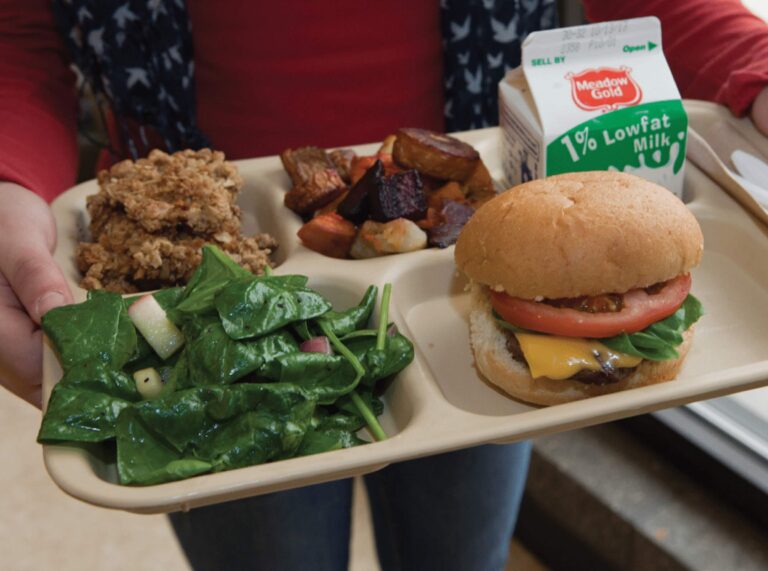Your 2023 Child Nutrition Policy Year in Review
Take a look at the biggest policy stories from the past year.
Join our corps! Applications for 2026-2027 are now open. Apply by March 30.
Take a look at the biggest policy stories from the past year.

It’s hard to believe another year has passed so quickly—and with it an array of wins for free school meals, farm to school, and other policy initiatives that help feed our nation’s kids. Read on to learn about the biggest child nutrition policy stories from the past year, and what might be coming up next year.
There’s been lots to celebrate all over the country this year when it comes to school meals for all. Lawmakers have made free school meals for all permanent in at least eight states, and similar laws are temporary or pending in at least three others.
FoodCorps played a particularly important role in promoting this legislation in New Mexico, where some of our staff supported an advocacy day for students and families at the state legislature. FoodCorps is now supporting the state’s efforts to implement the policy as they facilitate a rulemaking process with stakeholder listening sessions across the state. Stay tuned as this process unfolds into next year.
Michigan passed school meals for all as a budget initiative and is forging ahead to ensure the law becomes permanent in statute. Massachusetts is the most recent state to codify school meals for all, pairing the legislation with deeper investments in food education. Connecticut has extended school meals through this school year. The state is also investing significantly more money in locally sourced school food by doubling support for the CT Grown for CT Kids Grants Program and the creation of the CT Local Food for Schools Incentive Program. These policies were built from strong practitioner and grassroots input across the state, and we are excited to see this work take shape in 2024 and beyond.
Next year, Washington, D.C.—and possibly other states—will consider making school meals free for all students. FoodCorps, our alumni, and partners have submitted testimony supporting these measures, and we look forward to keeping up this momentum until every child in every state has access to nourishing, free school meals.
With a tight Congressional calendar and looming expiration date, the Farm Bill was extended through September 30, 2024. Advocates are hopeful that Congress will take up this massive policy package in early 2024 before election season is fully underway.
As a reminder, the Farm Bill has major implications for our food system: programs like SNAP, connections between farmers and school food operators, and healthy supply chains that get food to schools all rely on the Farm Bill to run smoothly. One program that could see a boost from the Farm Bill is the Fresh Fruit and Vegetable Program, which offers kids in participating schools a fresh fruit or veggie snack during the school day for free.
Encouragingly, policy measures outlined in the Farm Bill have support from both sides of the legislature. Senator Marco Rubio (R-FL), for example, has authored legislation to expand the Fresh Fruit and Vegetable Program via the Farm Bill. The Farm to School Act of 2023 was introduced in a bipartisan, bicameral effort. This legislation increases the investment in farm to school to ensure fresh and local foods are available to kids at school. And longtime FoodCorps supporter Senator Debbie Stabenow (D-MI) visited a FoodCorps site in the spring to hear firsthand about the power of garden and farm education.
Still, passing legislation as robust as the Farm Bill will have its roadblocks. We’re hopeful that lawmakers will be able to agree on the importance of this bill in ensuring our children are nourished and ready to learn.
On the heels of last year’s White House Conference on Hunger, Nutrition, and Health, we’ve seen even more commitments and leadership from the USDA when it comes to supporting schools in nourishing kids.
For one, the USDA has given nearly $30 million in grants to more than 250 school food authorities (SFAs) through its Healthy Meals Incentives program. This program gives schools with unequal access to nourishing food more resources for their nutrition programs, helping them to invest in upgrades like modernized kitchens or more staff training. And during National School Lunch Week in October, USDA Secretary Tom Vilsack announced the two open grant opportunities as part of this funding to support schools in providing nourishing food: SCALES and PLANTS, both open until late January.
In addition, the USDA finalized its new Community Eligibility Provision (CEP) rule in September. Under the new rule, fewer students need to qualify for free school meals at a particular school in order for that school to automatically offer free meals to all students, regardless of their family income or their registration for free meals.
These moves align squarely with the White House Challenge to End Hunger and Build Healthy Communities, a nationwide call-to-action for both the public and private sectors to transform community wellness by 2030.
Late this year, FoodCorps welcomed a cohort of 17 new Alumni Advocacy Leads, who will support local and state policy and advocacy efforts in the coming year around child nutrition issues in their communities. We look forward to keeping you posted on their inspiring work! We’re also gearing up for another presidential election year—can you believe it?—and anticipating lots more farm to school and Farm Bill advocacy in 2024.
Make sure you sign up for FoodCorps policy emails so you don’t miss the chance to raise your voice in 2024. Thank you for joining us for this exciting year in child nutrition policy!

3 Reasons We Need School Meals for All

Mindful Tasting: Eating with All 5 Senses

Our 2025 Child Nutrition Policy Year in Review